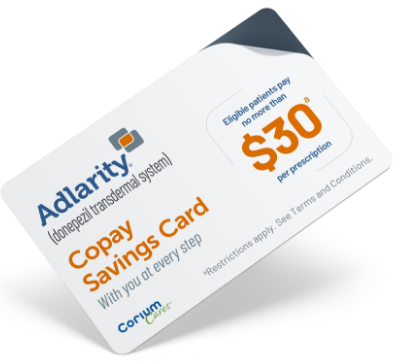For US Healthcare Professionals only.



ADLARITY is available through select commercial plans. Like many recently approved products, access and coverage will expand over time. We are committed to making ADLARITY affordable.
Commercially eligible patients pay no more than $30.a
aRestrictions apply. See Terms and Conditions at ADLARITY.com.
This offer is good for eligible commercially insured patients with a valid ADLARITY prescription and may not be used for any other product. Uninsured patients and cash-paying patients are not eligible. This offer is not insurance and is not valid for patients covered under Medicaid, Medicare, TRICARE, or any other federal or state healthcare program.
Questions about copay support or access to ADLARITY?
ADLARITY is indicated for the treatment of mild, moderate, and severe dementia of the Alzheimer's type.
ADLARITY is contraindicated in patients with known hypersensitivity to donepezil or to piperidine derivatives or with a history of allergic dermatitis with use of ADLARITY.
ADLARITY is indicated for the treatment of mild, moderate, and severe dementia of the Alzheimer's type.
ADLARITY is contraindicated in patients with known hypersensitivity to donepezil or to piperidine derivatives or with a history of allergic dermatitis with use of ADLARITY.
The most common adverse reactions (greater than 5% with donepezil tablets and twice the placebo rate) are nausea, diarrhea, insomnia, vomiting, muscle cramps, fatigue, and anorexia.
Cholinesterase inhibitors, including donepezil, have the potential to interfere with the activity of anticholinergic medications. A synergistic effect may be expected when cholinesterase inhibitors are given concurrently with succinylcholine, similar neuromuscular blocking agents, or cholinergic agonists such as bethanechol.
You are encouraged to report negative side effects of prescription drugs to the FDA. Visit www.fda.gov/MedWatch or call 1‑800‑FDA‑1088. Please click here for Full Prescribing Information.
Adlarity® (donepezil transdermal system) 5mg and 10mg patches have been voluntarily withdrawn due to a matter related to the product’s contract manufacturer. This decision is not related to any safety or efficacy issues with the product. Healthcare professionals can contact 1-800-910-8432. Patients should talk to their healthcare professionals.